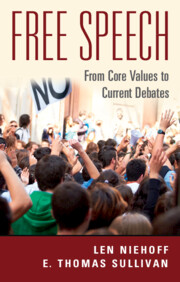Introduction
Published online by Cambridge University Press: 30 April 2022
Summary
Debates about free expression are a fixture of everyday discourse. Discussions of free speech issues abound, not just on college campuses and in law schools, but also in the workplace, in living rooms, around dinner tables, at social events, and in the popular media. Those conversations explore such issues as whether a professional football player has a right to protest during the national anthem, whether the government has the power to restrict the speech of people with extremist views, whether someone should be able to express dissent by burning the flag, whether “political correctness” results in objectionable self-censorship, whether campaign contributions should count as speech, and whether the media deserve the protections that the First Amendment provides or abuse those privileges in order to spread “fake news.” Mainstream debates even delve into such exotic questions as whether the President has to let people with whom he disagrees participate in his Twitter feed and whether the First Amendment gives a baker the right to refuse to make a cake for a gay wedding that he opposes on religious grounds. Across all of these issues, people recognize that speech matters but also has consequences.
- Type
- Chapter
- Information
- Free SpeechFrom Core Values to Current Debates, pp. 1 - 8Publisher: Cambridge University PressPrint publication year: 2022



